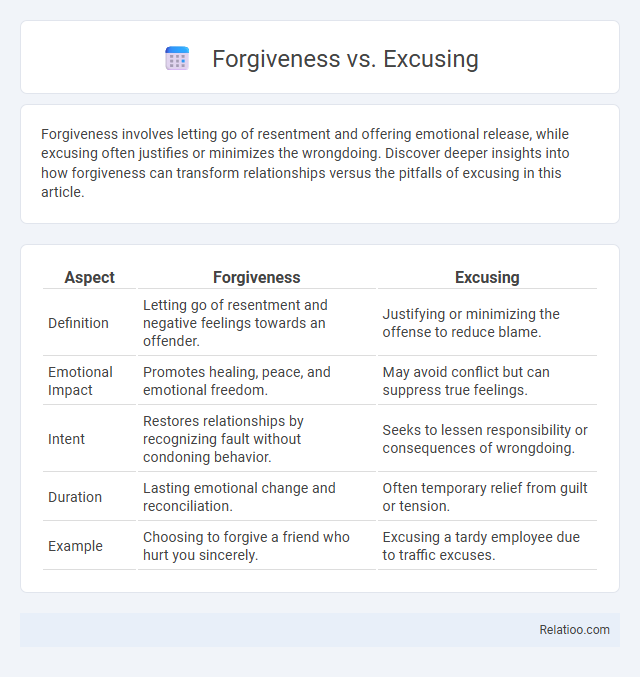Forgiveness involves letting go of resentment and offering emotional release, while excusing often justifies or minimizes the wrongdoing. Discover deeper insights into how forgiveness can transform relationships versus the pitfalls of excusing in this article.
Table of Comparison
| Aspect | Forgiveness | Excusing |
|---|---|---|
| Definition | Letting go of resentment and negative feelings towards an offender. | Justifying or minimizing the offense to reduce blame. |
| Emotional Impact | Promotes healing, peace, and emotional freedom. | May avoid conflict but can suppress true feelings. |
| Intent | Restores relationships by recognizing fault without condoning behavior. | Seeks to lessen responsibility or consequences of wrongdoing. |
| Duration | Lasting emotional change and reconciliation. | Often temporary relief from guilt or tension. |
| Example | Choosing to forgive a friend who hurt you sincerely. | Excusing a tardy employee due to traffic excuses. |
Understanding Forgiveness: A Deep Dive
Understanding forgiveness involves recognizing it as an intentional act of releasing resentment toward someone who has caused harm, without necessarily excusing their behavior or denying their fault. Forgiveness empowers your emotional well-being by fostering healing and closure, distinct from excusing, which minimizes the offense, and admitting fault, which assigns responsibility. This deep dive into forgiveness highlights its role in personal growth and relational repair, emphasizing acceptance rather than justification or blame.
What Does It Mean to Excuse?
To excuse means to acknowledge a fault or wrongdoing while choosing to overlook it, often due to understanding the context, intentions, or circumstances behind the behavior. It differs from forgiveness, which involves letting go of resentment or judgment toward the person who caused harm. Your ability to excuse someone reflects empathy and the recognition that mistakes or faults do not always warrant harsh condemnation.
Key Differences Between Forgiving and Excusing
Forgiving involves releasing resentment and emotional burden, allowing Your healing without necessarily condoning the wrongdoing. Excusing often implies justifying or minimizing the fault, which can prevent accountability and hinder true resolution. Fault identifies responsibility for the wrongdoing, whereas forgiveness focuses on personal peace beyond assigning blame.
Emotional Impact: Forgiveness vs Excusing
Forgiveness releases your emotional burden by accepting the wrongdoing without condoning the behavior, promoting healing and personal growth. Excusing, however, minimizes the offense, often leading to unresolved feelings and potential resentment. Understanding the emotional impact of forgiveness versus excusing helps you achieve genuine peace and emotional clarity.
The Role of Accountability in Forgiveness
Accountability plays a crucial role in forgiveness by fostering genuine recognition of fault and encouraging meaningful change. When you hold others accountable for their actions, forgiveness becomes a deliberate choice rooted in understanding rather than excusing harmful behavior. Emphasizing responsibility ensures that forgiveness promotes healing while maintaining clear boundaries between acknowledging fault and condoning it.
When Excusing Becomes Harmful
Excusing harmful behavior can perpetuate negative patterns by minimizing accountability and enabling repeated offenses, which undermines personal growth and trust in relationships. Forgiveness involves acknowledging fault while releasing resentment, promoting healing without condoning the action. Recognizing the distinction between fault, excusing, and forgiveness helps maintain healthy boundaries and fosters genuine reconciliation.
Cultural Perspectives on Forgiveness and Excusing
Cultural perspectives on forgiveness and excusing shape how communities interpret fault and responsibility, influencing social harmony and conflict resolution. In collectivist societies, forgiveness often emphasizes restoring relationships and social cohesion, while excusing might be used to acknowledge external circumstances mitigating fault. Understanding these cultural nuances helps you navigate interpersonal dynamics more empathetically and effectively.
How to Practice Genuine Forgiveness
Genuine forgiveness involves recognizing the fault without excusing the behavior, allowing emotional release while maintaining personal boundaries. Practicing forgiveness requires empathy, understanding the offender's perspective, and consciously choosing to let go of resentment to promote healing. Consistent self-reflection and compassionate communication support the transformation from blame to acceptance, fostering emotional resilience.
Common Misconceptions About Forgiving and Excusing
Forgiving involves releasing resentment toward someone who has caused harm, while excusing minimizes or justifies the wrongdoing, often linked to external circumstances. Common misconceptions confuse forgiveness with condoning bad behavior, but forgiveness does not mean excusing the fault or absolving responsibility. Understanding this distinction is crucial for emotional healing and maintaining healthy boundaries in relationships.
Choosing Forgiveness Over Excusing for Personal Growth
Choosing forgiveness over excusing empowers your emotional resilience by acknowledging faults without condoning harmful behavior. Forgiveness promotes healing and personal growth, while excusing may enable repeated mistakes and hinder accountability. Embracing forgiveness fosters self-awareness and strengthens relationships by separating actions from identity.

Infographic: Forgiveness vs Excusing
 relatioo.com
relatioo.com